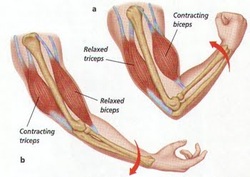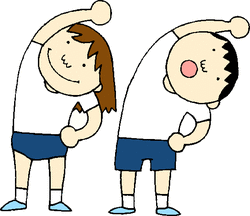How Does the Muscular System to Overall Health and Well-being of a Human?
How muscles work
All muscles contract when they are stimulated. Muscle cells are excitable because the membrane of each cell is electrically charged. Thus, a muscle cell is said to have electrically potential. This electric potential results from the presence of sodium and potassium ions on each side of the membrane. Potassium ions easily move through the membrane and accumulate in the cell. Sodium ions do not enter the cell as easily. In addition, the membrane has a special mechanism that pumps potassium into the cell and pumps sodium out. Consequently, the cell normally contains much potassium but little sodium.
All muscles contract when they are stimulated. Muscle cells are excitable because the membrane of each cell is electrically charged. Thus, a muscle cell is said to have electrically potential. This electric potential results from the presence of sodium and potassium ions on each side of the membrane. Potassium ions easily move through the membrane and accumulate in the cell. Sodium ions do not enter the cell as easily. In addition, the membrane has a special mechanism that pumps potassium into the cell and pumps sodium out. Consequently, the cell normally contains much potassium but little sodium.
Muscle Coordination
The movements that the body makes are smooth and steady. The movements are carefully controlled by the central nervous system. The instructions that make the muscles of the body work come from a part of the brain called the motor cortex, in the cerebrum. Another part of the brain, called the cerebellum, ensures that all muscles work together smoothly. When you take a book down from a a shelf, many muscles work together to carry out this simple action. The cerebellum gets all these muscles working at precisley the right time. The brain must get continuous information about the position of every muscle in the body. It would not be able to control all the body's movements without this information. Nerve cells pick up signals from the muscles to send to the brain. These signals tell the brain exactly where each muscle is. They also let the brain know how much each muscle is contracting. The brain can send out the proper instructions to the muscles.
How to get Strong, Healthy Muscles
It sounds too simple, but it's true. Playing, running, jumping, and riding your bike can make your muscles stronger. Any physical activity you like to do - from dancing to playing football - can make you stronger. Why? Because you're using your muscles when you do it.
What should you eat if you want strong muscles? You might think you need a lot of foods that contain protein (such as meat and eggs) or foods that contain iron. But there's no one magical food that helps build muscles. Your muscles - and your entire body - will be strong and healthy if you eat a variety of nutritious foods.
Some kids want to lift weights so they can look bigger and stronger. But lifting weights won't produce big muscles in kids who haven't gone through puberty yet, and lifting heavy weights can be dangerous to kids’ muscles and tendons.
With supervision from a coach or trainer, kids can do some light weight lifting or exercise with resistance bands (large rubber bands). This kind of exercise can improve muscle tone, meaning a kid's muscles will be leaner and stronger, but not really bigger.
Push-ups, sit-ups, and chin-ups also help build strong muscles. But so can plain old running, jumping, and climbing. Get the message? More play time means stronger muscles. Now that's something to get pumped up about!
How to Work Your Muscles
Nutrition- The best thing you can do is eat a variety of foods. By eating a variety of foods, your body will get the nutrients that it needs to make your muscles and bones stronger.
Aerobic Excersice- Running, swimming, and cycling are some ways to keep your muscles in shape. When you are exercising aerobically, it means that your body is continuing to get the amount of oxygen it needs to keep doing that activity over a long period of time. Muscles are helped by aerobic activity because excersicing makes them stronger and increases thier blood flow, which keeps them healthy
Strength Training- Strength training like weight lifting help your muscles stay strong. Strength training is any activity in which you work your muscles against some kind of resistance. You should try to do a combination of weight lifting activities that excersice the muscles in your arms, mid section, and legs to keep a well proportioned body.
Stretching
The movements that the body makes are smooth and steady. The movements are carefully controlled by the central nervous system. The instructions that make the muscles of the body work come from a part of the brain called the motor cortex, in the cerebrum. Another part of the brain, called the cerebellum, ensures that all muscles work together smoothly. When you take a book down from a a shelf, many muscles work together to carry out this simple action. The cerebellum gets all these muscles working at precisley the right time. The brain must get continuous information about the position of every muscle in the body. It would not be able to control all the body's movements without this information. Nerve cells pick up signals from the muscles to send to the brain. These signals tell the brain exactly where each muscle is. They also let the brain know how much each muscle is contracting. The brain can send out the proper instructions to the muscles.
How to get Strong, Healthy Muscles
It sounds too simple, but it's true. Playing, running, jumping, and riding your bike can make your muscles stronger. Any physical activity you like to do - from dancing to playing football - can make you stronger. Why? Because you're using your muscles when you do it.
What should you eat if you want strong muscles? You might think you need a lot of foods that contain protein (such as meat and eggs) or foods that contain iron. But there's no one magical food that helps build muscles. Your muscles - and your entire body - will be strong and healthy if you eat a variety of nutritious foods.
Some kids want to lift weights so they can look bigger and stronger. But lifting weights won't produce big muscles in kids who haven't gone through puberty yet, and lifting heavy weights can be dangerous to kids’ muscles and tendons.
With supervision from a coach or trainer, kids can do some light weight lifting or exercise with resistance bands (large rubber bands). This kind of exercise can improve muscle tone, meaning a kid's muscles will be leaner and stronger, but not really bigger.
Push-ups, sit-ups, and chin-ups also help build strong muscles. But so can plain old running, jumping, and climbing. Get the message? More play time means stronger muscles. Now that's something to get pumped up about!
How to Work Your Muscles
Nutrition- The best thing you can do is eat a variety of foods. By eating a variety of foods, your body will get the nutrients that it needs to make your muscles and bones stronger.
Aerobic Excersice- Running, swimming, and cycling are some ways to keep your muscles in shape. When you are exercising aerobically, it means that your body is continuing to get the amount of oxygen it needs to keep doing that activity over a long period of time. Muscles are helped by aerobic activity because excersicing makes them stronger and increases thier blood flow, which keeps them healthy
Strength Training- Strength training like weight lifting help your muscles stay strong. Strength training is any activity in which you work your muscles against some kind of resistance. You should try to do a combination of weight lifting activities that excersice the muscles in your arms, mid section, and legs to keep a well proportioned body.
Stretching
- Stretch before and after an excersice
- Stretching your muscles prevents injuries
- It improves athletic performance
- It reduces muscle tensile contraction
- Stretching gives your joints a greater range of motio
- The average person is often too tight to just stand up straight
- Stretching helps functional tightness


